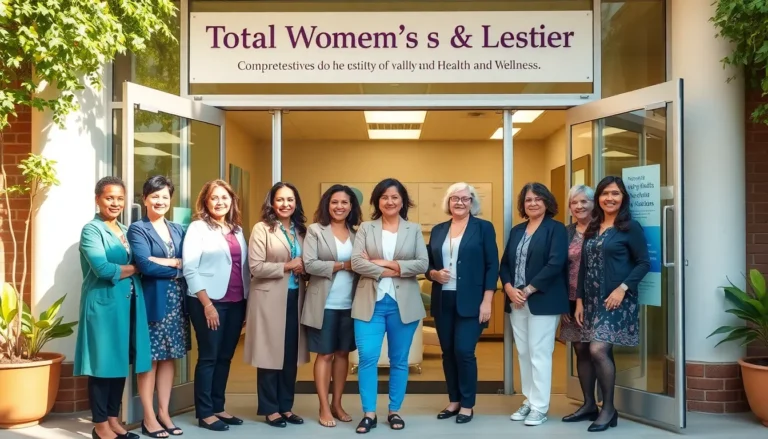Table of Contents
ToggleWhen it comes to women’s health, understanding gynecology and obstetrics can feel like trying to navigate a maze without a map. Don’t sweat it. In Connecticut, women have access to top-notch healthcare services that prioritize their unique needs. From routine check-ups to navigating pregnancy, experts are here to make the journey smoother. So, grab a comfy seat as we jump into the essentials of women’s health in CT, from common gynecological conditions to what to expect during obstetric care. Who said learning about health had to be dry? Let’s keep it light and informative.
Overview of Women’s Health Services

Women’s health services encompass a broad range of specialties, including gynecology and obstetrics, tailored to meet the unique needs of women at different life stages. These services aim to provide holistic care, addressing physical, emotional, and reproductive health concerns. Gynecology focuses primarily on the female reproductive system, offering preventive care, routine examinations, and treatments for various conditions. Obstetrics, on the other hand, is all about pregnancy, childbirth, and postpartum care. Both fields are crucial for maintaining women’s health and ensuring that they have informed choices about their bodies and lives.
In Connecticut, facilities provide cutting-edge resources paired with compassionate care, aiming to make healthcare appointments less daunting and more empowering. From state-of-the-art imaging technology to integrated care options, women can find an array of services that cater to their individual needs.
Importance of Gynecology and Obstetrics
Gynecology and obstetrics are more than just medical specialties: they represent a commitment to women throughout their health journeys. Whether it’s regular health screenings or navigating the complexities of pregnancy, these fields are critical for preventive care and women’s overall wellbeing. Regular visits to a gynecologist can help detect issues early, from common infections to serious conditions such as endometriosis or cervical cancer.
Obstetric care is no less vital. As pregnancy can be a rollercoaster of emotions and physical changes, having an experienced obstetrician can help ensure that both mother and baby remain healthy throughout gestation and delivery. Women who receive proper obstetric care often have better outcomes during pregnancy, reflecting the importance of these services in supporting maternal and infant health.
Common Gynecological Conditions
Women may encounter various gynecological conditions at some point in their lives. Some of the most common issues include:
Menstrual Disorders
Menstrual problems, such as heavy bleeding or irregular periods, can significantly impact a woman’s daily life.
Polycystic Ovary Syndrome (PCOS)
PCOS is a hormonal disorder affecting many women of childbearing age. It can lead to irregular periods, weight gain, and fertility issues.
Endometriosis
This painful condition occurs when tissue similar to the lining of the uterus grows outside of it, leading to severe pain and potential fertility challenges.
Fibroids
Uterine fibroids are noncancerous growths that can cause heavy periods and pain. Their presence often requires consultation with a gynecologist to determine the best course of action.
Recognizing these conditions early can lead to effective treatments, significantly improving a woman’s quality of life.
Obstetric Care: What to Expect
Obstetric care is designed to support women before, during, and after pregnancy. Expectant mothers can anticipate a series of appointments that will monitor the health of both mother and baby throughout the trimesters. Initially, the doctor will confirm the pregnancy through blood tests or ultrasounds, followed by regular check-ups to assess fetal development and maternal health.
During these visits, healthcare providers will address common concerns, including:
- Nutrition and weight management
- Prenatal vitamins and supplements
- Screening for genetic conditions
- Labor and delivery planning
- Postpartum care
Understanding what to expect during obstetric visits can alleviate anxiety and empower women to engage actively in their prenatal care.
Preventive Health Screenings for Women
Preventive health screenings are essential components of women’s healthcare that often get overlooked. Regular screenings can help detect potential issues before they become serious problems. Essential screenings include:
Pap Smears
These exams are vital for early detection of cervical cancer and should begin at age 21, regardless of sexual history.
Mammograms
Starting at age 40, women should begin yearly mammogram screenings to detect breast cancer early.
Blood Pressure and Cholesterol Check
Routine checks can highlight health risks associated with heart disease, especially as women age.
Bone Density Tests
Recommended for women over 65, these tests help assess risk for osteoporosis, a condition that weakens bones.
Women should feel empowered to advocate for their health. Regular screenings can save lives and contribute to long-term well-being.
Choosing the Right Healthcare Provider
Finding the right healthcare provider is a crucial step in ensuring quality women’s health care. Women should look for practitioners who not only possess the necessary qualifications but also resonate with their values. Here are some tips for making the best choice:
- Check Credentials: Ensure that the provider is board-certified and has appropriate training in gynecology or obstetrics.
- Consider Experience: Experience matters. Look for a provider with a solid background in treating specific conditions or overseeing pregnancies.
- Communication Style: It’s essential to choose someone who listens, respects concerns, and communicates clearly.
- Reviews and Recommendations: Scour online reviews or ask friends and family for recommendations to get a sense of the provider’s reputation.
Taking the time to choose the right healthcare provider is an investment in health, and women should feel comfortable discussing their needs with a potential provider.







